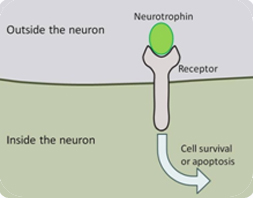Recombinant Neurotrophins

Neurotrophins are a family of growth factor, which are capable of promoting the growth and survival of neurons. For this, there has been a great deal of research done on using it as a possible therapy for people suffering from disorders involving neuronal degeneration and physical trauma resulting in the severing of nerve connections.
They are large protein molecules produced by the nervous system cells. During the nervous system development, neurotrophins are secreted by nerve target cells or surrounding glia, and Only the neurons with sufficient neurotrophins will survive.
The mechanism of neurotrophins is binding to a specific tyrosine kinase receptor on a nerve terminal, which leads to endocytosis of the receptor-neurotrophin complex. The vesicle that contains the complex is then transported by dynein along various microtubules up to the axon and to the soma. Along the way, the complex will initiate a signal transduction cascade that ultimately inhibits the genes for apoptosis, thus keeping the neuron cell alive.
The neurotrophins can be divided into nerve growth factor (NGF), brain-derived neurotrophic factor (BDNF), neurotrophin-4 (NT-4) and some others. NGF is vital for the development and the maintenance of both central and peripheral nervous system neurons. It plays a key role in preventing neuronal degeneration. BDNF helps to support the survival of existing neurons, and encourage the growth and differentiation of new neurons and synapses through axonal and dendritic sprouting. NT-4 is a neurotrophic factor that signals predominantly through the TrkB receptor tyrosine kinase.
Our products are only for laboratory research use, not intended for diagnostic or therapeutic purposes.
Ex Tax: $0.00
Ex Tax: $0.00
Ex Tax: $0.00
Ex Tax: $0.00
Ex Tax: $0.00
Ex Tax: $0.00
Ex Tax: $0.00
Ex Tax: $0.00
Ex Tax: $0.00
Ex Tax: $0.00
Ex Tax: $0.00

